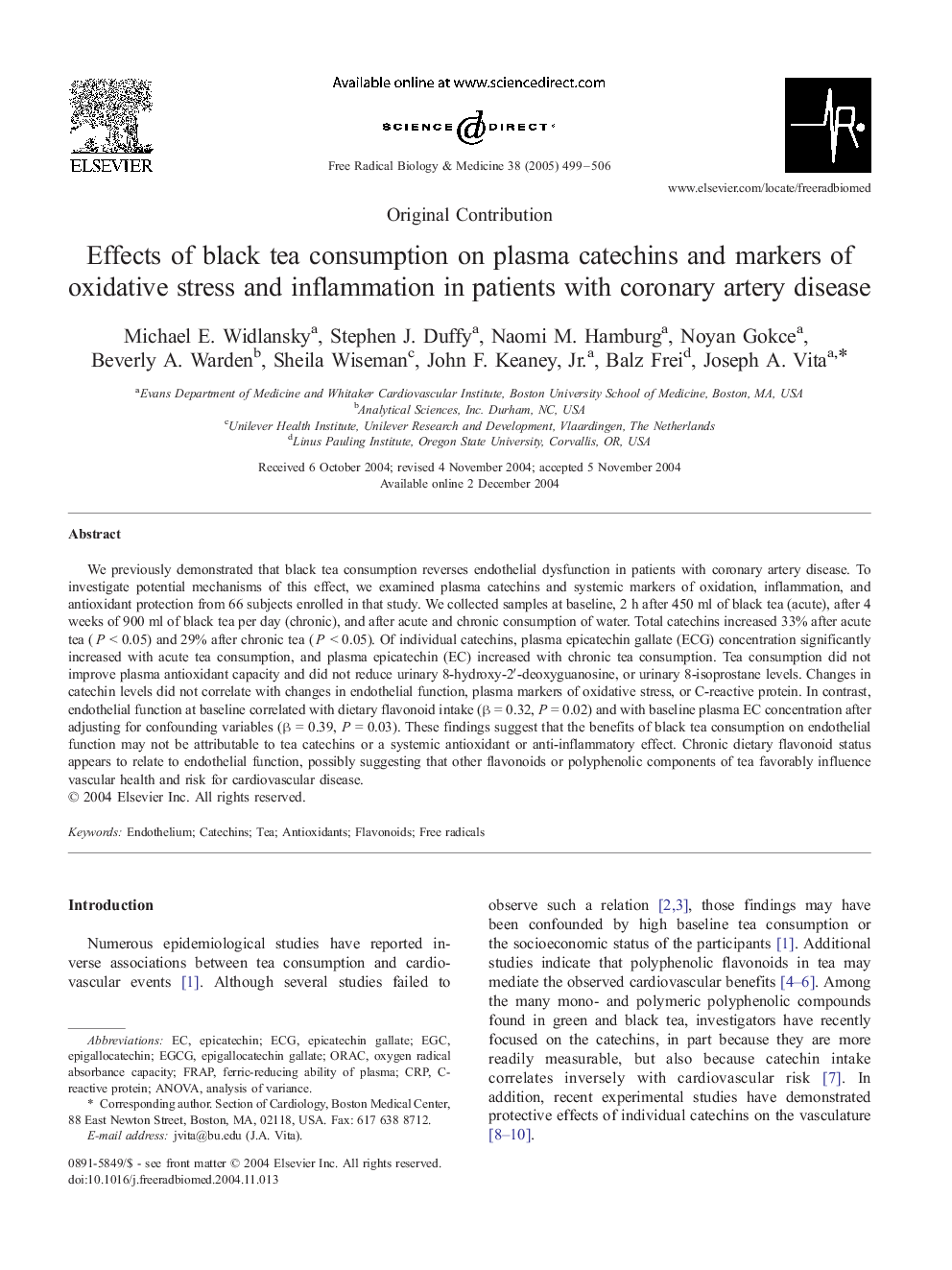| کد مقاله | کد نشریه | سال انتشار | مقاله انگلیسی | نسخه تمام متن |
|---|---|---|---|---|
| 10739622 | 1046882 | 2005 | 8 صفحه PDF | دانلود رایگان |
عنوان انگلیسی مقاله ISI
Effects of black tea consumption on plasma catechins and markers of oxidative stress and inflammation in patients with coronary artery disease
دانلود مقاله + سفارش ترجمه
دانلود مقاله ISI انگلیسی
رایگان برای ایرانیان
کلمات کلیدی
Ferric-reducing ability of plasmaepicatechinepigallocatechinORACEGCCatechinsEGCGFRAPAntioxidants - آنتی اکسیدانECG - الکتروکاردیوگرام یا نوار قلبEndothelium - اندوتلیومepicatechin gallate - اپیکتچین گالاتepigallocatechin gallate - اپی گالوستاچین گالاتanalysis of variance - تحلیل واریانسANOVA - تحلیل واریانس Analysis of varianceFree radicals - رادیکال آزادoxygen radical absorbance capacity - ظرفیت جذب رادیکال رادیکالFlavonoids - فلاونوئیدهاC-reactive protein - پروتئین واکنشی سیCRP - پروتئین واکنشی سی یا سی. آر. پی TEA - چای
موضوعات مرتبط
علوم زیستی و بیوفناوری
بیوشیمی، ژنتیک و زیست شناسی مولکولی
سالمندی
پیش نمایش صفحه اول مقاله

چکیده انگلیسی
We previously demonstrated that black tea consumption reverses endothelial dysfunction in patients with coronary artery disease. To investigate potential mechanisms of this effect, we examined plasma catechins and systemic markers of oxidation, inflammation, and antioxidant protection from 66 subjects enrolled in that study. We collected samples at baseline, 2 h after 450 ml of black tea (acute), after 4 weeks of 900 ml of black tea per day (chronic), and after acute and chronic consumption of water. Total catechins increased 33% after acute tea (P < 0.05) and 29% after chronic tea (P < 0.05). Of individual catechins, plasma epicatechin gallate (ECG) concentration significantly increased with acute tea consumption, and plasma epicatechin (EC) increased with chronic tea consumption. Tea consumption did not improve plasma antioxidant capacity and did not reduce urinary 8-hydroxy-2â²-deoxyguanosine, or urinary 8-isoprostane levels. Changes in catechin levels did not correlate with changes in endothelial function, plasma markers of oxidative stress, or C-reactive protein. In contrast, endothelial function at baseline correlated with dietary flavonoid intake (β = 0.32, P = 0.02) and with baseline plasma EC concentration after adjusting for confounding variables (β = 0.39, P = 0.03). These findings suggest that the benefits of black tea consumption on endothelial function may not be attributable to tea catechins or a systemic antioxidant or anti-inflammatory effect. Chronic dietary flavonoid status appears to relate to endothelial function, possibly suggesting that other flavonoids or polyphenolic components of tea favorably influence vascular health and risk for cardiovascular disease.
ناشر
Database: Elsevier - ScienceDirect (ساینس دایرکت)
Journal: Free Radical Biology and Medicine - Volume 38, Issue 4, 15 February 2005, Pages 499-506
Journal: Free Radical Biology and Medicine - Volume 38, Issue 4, 15 February 2005, Pages 499-506
نویسندگان
Michael E. Widlansky, Stephen J. Duffy, Naomi M. Hamburg, Noyan Gokce, Beverly A. Warden, Sheila Wiseman, John F. Jr., Balz Frei, Joseph A. Vita,